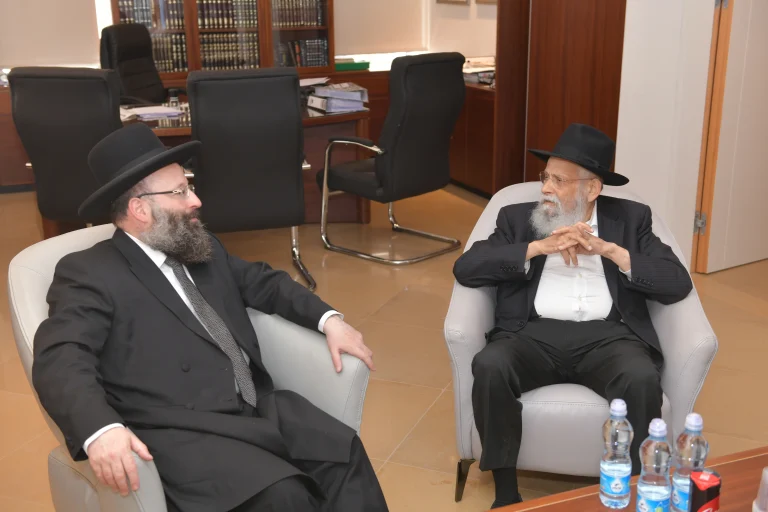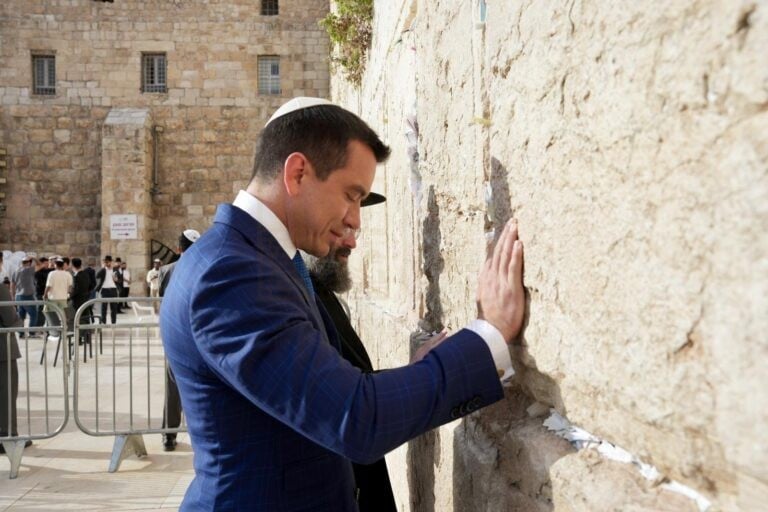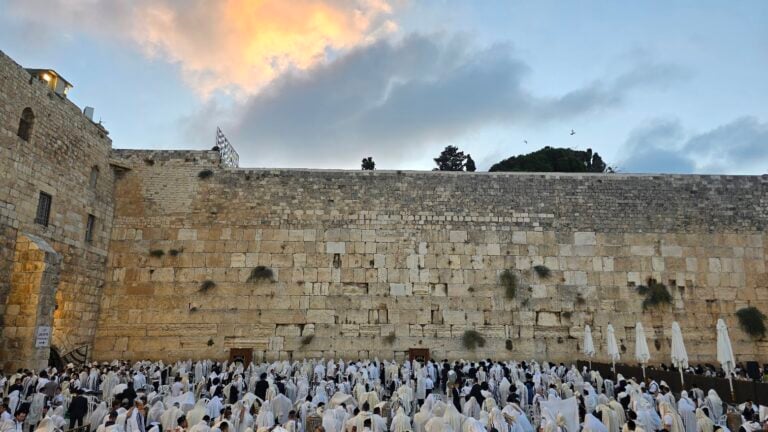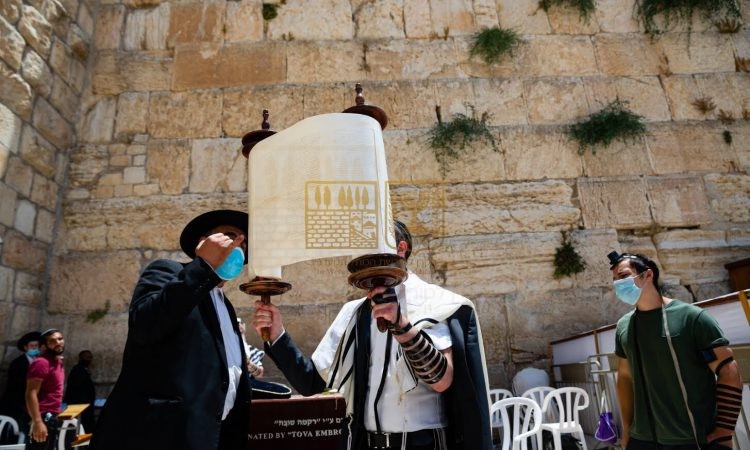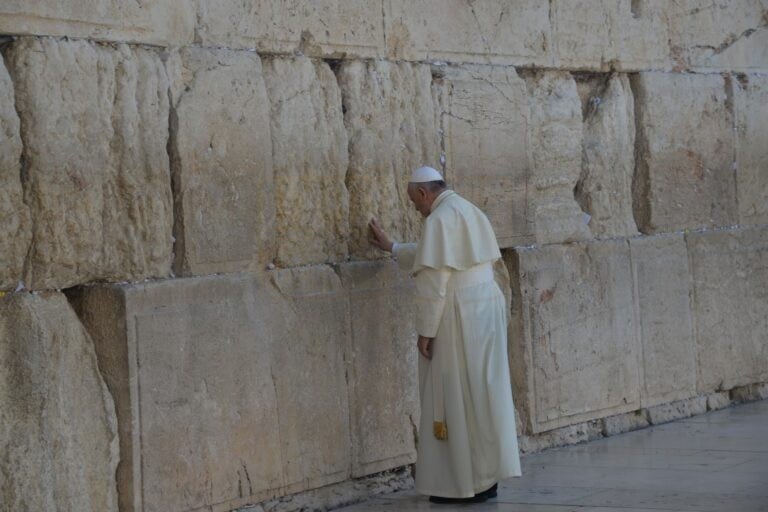Shavuot 5784
Rabbi Shmuel Rabinowitz, Rabbi of the Western Wall and Holy Sites
On Tuesday evening we will begin celebrating the holiday of Shavuot (Tabernacles) (in Israel until the Wednesday evening and outside of Israel until Thursday evening). The defining historical event, when the Torah was given to the people of Israel through Moses on Mount Sinai, took place on this day. First, the Ten Commandments were given in a divine revelation to all the People of Israel, and then Moses ascended to the summit of Mount Sinai, where he was given the rest of the commandments of the Torah.
The Babylonian Talmud cites a wonderful legend that describes a debate between Moses, who went up to receive the Torah, and the angels:
And Rabbi Yehoshua ben Levi said: When Moses ascended on High to receive the Torah, the ministering angels said before the Holy One, Blessed be He: Master of the Universe, what is one born of a woman doing here among us?
The Holy One, Blessed be He, said to them: He came to receive the Torah.
The angels said before Him: The Torah is a hidden treasure that was concealed by You 974 generations before the creation of the world, and You seek to give it to flesh and blood? “What is man that You are mindful of him and the son of man that You think of him?” (Psalms 8:5).
The Holy One, Blessed be He, said to Moses: Provide them with an answer as to why the Torah should be given to the people.
Moses said before Him: Master of the Universe, the Torah that You are giving me, what is written in it? God said to him: “I am the Lord your God Who brought you out of Egypt from the house of bondage” (Exodus 20:2). Moses said to the angels: Did you descend to Egypt? Were you enslaved to Pharaoh? Why should the Torah be yours?
Again Moses asked: What else is written in it? God said to him: “You shall have no other gods before Me” (Exodus 20:3).
Moses said to the angels: Do you dwell among the nations who worship idols that you require this special warning? Again Moses asked: What else is written in it? The Holy One, Blessed be He, said to him: “Remember the Shabbat day to sanctify it” (Exodus 20:8). Moses asked the angels: Do you perform labor that you require rest from it?
Again Moses asked: What else is written in it? “Do not take the name of the Lord your God in vain” (Exodus 20:7). Moses asked the angels: Do you conduct business with one another that may lead you to swear falsely?
Again Moses asked: What else is written in it? The Holy One, Blessed be He, said to him: “Honor your father and your mother” (Exodus 20:12). Moses asked the angels: Do you have a father or a mother that would render the commandment to honor them relevant to you?
Again Moses asked: What else is written in it? God said to him: “You shall not murder, you shall not commit adultery, you shall not steal” (Exodus 20:13) Moses asked the angels: Is there jealousy among you, or is there an evil inclination within you that would render these commandments relevant?
Immediately they agreed with the Holy One, Blessed be He, that He made the right decision to give the Torah to the people.
(Masechet Shabbat, Page 88-89)
What does this legend teach us? Moshe Rabbenu “ascends to the top of the mountain,” that is to the highest point that a person is capable of reaching, and receives a divine revelation, during which he receives the Torah. But there are those who seek to interfere: the angels, who regard the giving of the Torah to humans as a degradation of the Torah. The angels, those heavenly beings who are described as servants of God, are puzzled and say to Him: You intend giving your precious treasure – the Torah – to humans? God does not answer them, but rather gives Moses the challenge: ‘Answer them’!
Moses does the obvious thing. He turns to the Torah, looks at its commandments and asks: Who is the Torah suitable for, if not for man? To whom does the Torah speak in the commandment “Honor your father and your mother,” if not to the person who is faced with the very question of their relationship with their parents? Who needed to rest on the holy day – the Sabbath – if not those who work the six days of the week? Who is the one who needs to be warned, “Thou shalt not murder, thou shalt not commit adultery, thou shalt not steal,” other than the person who is entangled in his passions and complex social relationships?
Moses’ answer is a winner. The angels surrendered. But what does this answer tell us?
Many times, we look at the Torah in awe, but from a distance. Certainly, the Torah is special to us, but it speaks to illustrious people. Maybe it is speaking to those who are studying Torah in the Beit Midrash, maybe to particularly righteous Jews who hide and avoid exposure to the wider world … Is the Torah really speaking to me? Is every boy and girl in the 21st century able to read the Torah and find an answer in it to any existential questions that bother them?
Moses claims that the answer to these questions is ‘Yes.’ He not only claims it, but also proves it. Look at the Torah itself and see that it deals with ordinary day-to-day life, with simple people, with questions that we all face. “It is not in heaven” – the Torah is not only about lofty and profound ideas. Rather, the Torah offers a balanced, healthy, and corrected way of life for each and every person.
